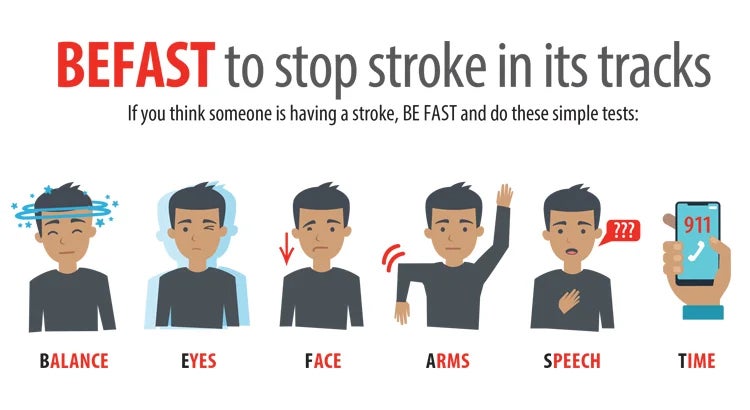What is a Stroke?
Simply put, a stroke is a "brain attack." It occurs when part of the body loses function due to a disruption of blood flow in the brain. When this happens, either because of blockage from buildup in the arteries or when a vessel in the brain bursts, the affected area can’t get oxygen or nutrients. This can cause a wide range of symptoms, including the following:
- Paralysis
- Vision loss
- Difficulty speaking
- Severe headache
Without oxygen rich blood and nutrients, brain cells in the affected area begin to malfunction and die. Learn more about different types of stroke.
Stroke Symptoms

Here are a few common symptoms of stroke:
- Sudden numbness or weakness of face, arm or leg, especially on one side of the body
- Sudden confusion or trouble speaking or understanding
- Sudden difficulty seeing in one or both eyes
- Sudden trouble walking, dizziness or loss of balance or coordination
- Sudden severe headache with no known cause
Stroke Risk Factors
High blood pressure is the number one risk factor for stroke. The following also increase risk for stroke:
- Diabetes
- Family history of stroke
- Heart disease
- High cholesterol Increasing age
- Certain medications, including birth control pills, make blood clots more likely, and therefore can increase chances for a stroke.
Hemorrhagic Stroke Risks
The following can increase the risk of hemorrhagic stroke (stroke caused by bleeding in the brain):
- Alcohol use
- Bleeding disorders
- Cocaine use
What About Age and Gender?
While the risk of stroke increases with age, a stroke can occur at any age, and nearly a quarter of strokes occur in people under the age of 65. Stroke is also not just a "man's disease." Although most women are more worried about getting breast cancer than they are about a stroke, twice as many women die of stroke than of breast cancer every year. During middle age, men are more likely to have a stroke than women, but the gender ratio reverses for people 85 and older, when women are more likely to experience a stroke.
What to Do If You Suspect a Stroke
Time is of the essence with a stroke. Fast action saves lives while decreasing the chances of lifelong disability, such as paralysis or blindness.
If you think you or someone you’re with is having a stroke, call 911 and get to your closest emergency department. We have skilled EMS providers in our area who can stabilize the patient and help physicians and staff prepare for the patient’s arrival.